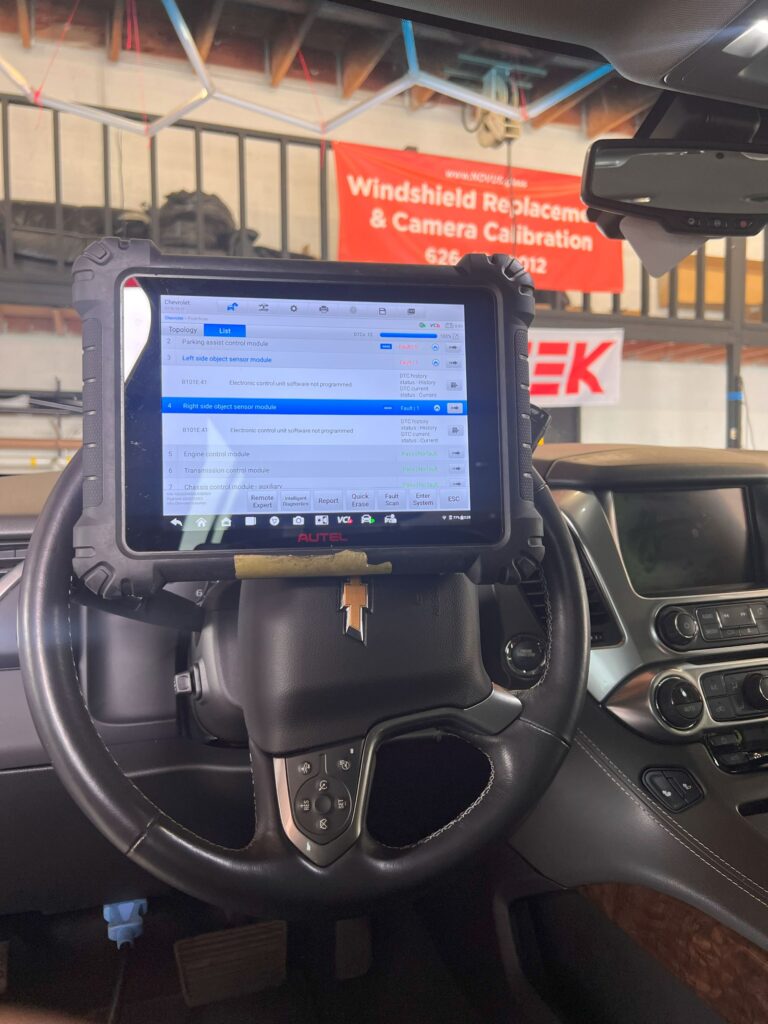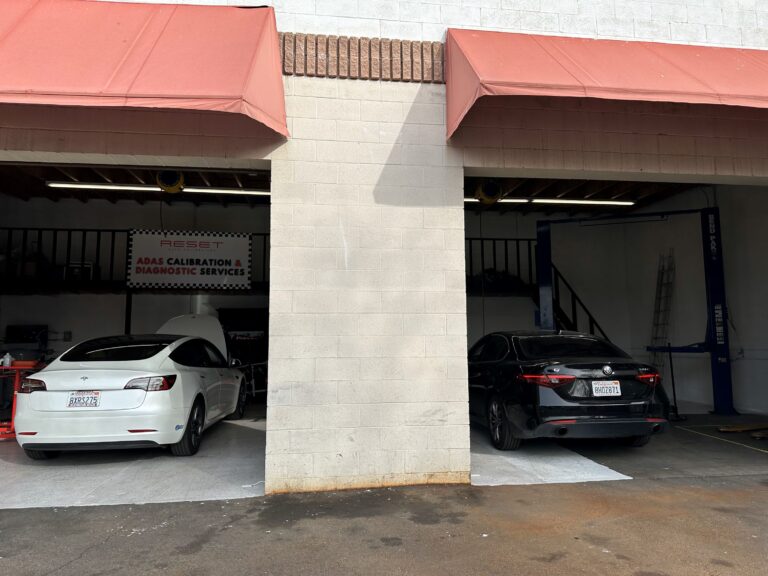ADAS Sensor Calibration Los Angeles

What’s in our ADAS Sensor Calibration in Los Angeles
Our ADAS sensor calibration service in Los Angeles is a sophisticated yet critical process that ensures the accurate, precise, and reliable functioning of various car safety and driver assistance features for a vast range of vehicle models. These involve, but not limited to, lane departure warning, adaptive cruise control, automatic emergency braking, and more. This service may involve ADAS recalibration of systems, especially after a collision.
Expertise and Experience
When it comes to ADAS sensor calibration, rely on our team of skilled and experienced technicians who provide top-notch service you can trust.
State-of-the-Art Equipment
At Reset Auto, your safety is our priority. That's why we exclusively use state-of-the-art equipment to maintain the precision of our ADAS sensor calibration, ensuring overall vehicle safety.
Commitment to Customer Safety and Satisfaction
With a firm commitment to your safety and satisfaction, you can trust us to deliver top-notch ADAS sensor calibration service, providing you with complete confidence on the road.
How ADAS Sensor Calibration Works
- Vehicle Inspection: Our skilled technicians begin by inspecting your vehicle’s ADAS components, including cameras, sensors, and radar systems, to identify any misalignments or issues.
- Precision Adjustment: Using state-of-the-art equipment, we meticulously adjust and realign the ADAS sensors to the manufacturer’s specifications, ensuring accurate data and reliable functionality.
- Calibration Setup: Next, we set up the calibration environment, which may involve placing the vehicle on a level surface and using specific targets or reference points.
- Data Retrieval: The ADAS sensors capture data during the calibration process, which helps in aligning the systems precisely.
- Calibration Execution: Our technicians initiate the calibration process, allowing the ADAS components to communicate and recalibrate to their correct positions.
- Verification and Testing: Once the calibration is complete, we conduct thorough tests to ensure the ADAS systems operate accurately, verifying their responsiveness and functionality.
- Test Drive: To ensure your vehicle performs optimally in real-world conditions, we may conduct a test drive to validate the recalibrated ADAS systems.
- Final Inspection: Our team performs a final inspection to ensure that all ADAS sensors and cameras are correctly aligned and functioning as intended.
- Customer Explanation: After the ADAS sensor calibration is completed, our technicians will explain the process, address any questions you may have, and provide recommendations for ongoing maintenance and calibration.
- Safety and Satisfaction: Your safety and satisfaction are our top priorities. With precise ADAS sensor calibration, you can drive with confidence, knowing your vehicle’s safety features are operating at their best.
Why Choose Reset Auto for Precision ADAS Sensor Calibration Services
Here are just six of the ADAS Sensor Calibration services we offer at our Los Angeles shop. To know more, call us so we could know your specific needs.
Car Camera Calibration
Your car’s camera is an essential component of your ADAS. Features like lane-keeping assist, lane departure warning are dependent on your camera. Camera calibration ensures that your car’s camera’s field of view, angle, and alignment are accurately aligned to ensure optimal functioning of related ADAS components.
Car Radar Calibration
Radar calibration ensures that your sensor accurately gauges distance and speeds to ensure it supplies reliable data for systems, such as adaptive cruise control, emergency braking, blind-spot monitoring, and other safety features work properly.
Lidar Calibration
In certain vehicles, Lidar (light Detection and Ranging) are essential in precisely mapping surroundings to ensure the optimal function of features, such as autonomous driving and pedestrian detection.
Ultrasonic Sensor Calibration
Ultrasonic sensor calibration are essential for vehicle models that use ultrasonic sensors for parking assist and obstacle detection. This service involves fixing the accuracy of detecting distances to enable them to supply accurate data for related features.
Steering Angle Sensor Calibration
Steering angle sensor calibration ensures that the sensor provides correct data to features, such as for lane-keeping assist which depend on accurate steering angle data.
Wheel Alignment Calibration
Wheel alignment calibration ensures that the wheel alignment data are accurate to enable the precise functioning of vehicle positioning needed for features, such as lane departure warning and adaptive cruise control.
Ensuring Precision and Quality in ADAS Sensor Calibration
At Reset Auto, we prioritize the safety of our customers by delivering exceptional precision and quality throughout our ADAS sensor calibration process.
Problem Consultation and Assessment
Our knowledgeable team provides a comprehensive consultation and assessment of your vehicle's ADAS, ensuring a thorough understanding of its sensor calibration needs.
ADAS Sensor Calibration Process
Utilizing state-of-the-art equipment and meticulous alignment, we follow manufacturer specifications to ensure optimal functionality of your vehicle's safety systems during the ADAS sensor calibration process.
Quality Control
With a strong commitment to safety, our rigorous quality control measures verify the precise sensor calibration of your vehicle's ADAS, providing you with the utmost confidence in your vehicle's enhanced safety features.
We Always Provide Precise and High-quality ADAS Sensor Calibration Services to Our Clients
For top-tier ADAS sensor calibration at a reasonable price, trust no other than Reset Automotive. Your safety is our priority.
Frequently Asked Questions About ADAS Sensor Calibration
Here are four of the top questions customers ask us about ADAS sensor calibration. If your question is not among the list, please feel free to send us a message through the link below. You may also call us to ask our staff.
The frequency of ADAS sensor calibration varies depending on the vehicle make, model, and the specific ADAS features it has. In general, manufacturers recommend having ADAS sensors calibrated:
- After a windshield replacement: Any time the windshield is replaced, ADAS sensor calibration is usually necessary, as the sensors may have been disturbed during the process.
- After collision repairs: If your vehicle has been involved in a collision, ADAS sensors may need calibration to ensure they function accurately.
- Whenever a relevant service or maintenance is performed: Some manufacturers recommend regular ADAS sensor calibration as part of routine maintenance to ensure optimal performance.
- When the ADAS system displays a warning or error message: If your vehicle's ADAS system indicates a calibration issue or malfunction, it should be checked and recalibrated as needed.
- Whenever a sensor or camera is replaced: If any ADAS sensor or camera is replaced, it's essential to calibrate the new component to work seamlessly with the rest of the system.
It's essential to follow the manufacturer's guidelines and consult with us to determine the specific recommended intervals for your vehicle's ADAS sensor calibration. Regular calibration ensures that the ADAS system operates accurately, maximizing safety and avoiding potential issues with advanced safety features.
There are several signs that may indicate your vehicle's ADAS sensors need calibration:
- Warning Lights: If any warning lights related to the ADAS system appear on your dashboard, it could indicate a calibration issue or malfunction.
- Error Messages: Some vehicles display error messages on the infotainment or instrument cluster screen when there is a problem with the ADAS sensors.
- Inaccurate ADAS Functionality: If your vehicle's ADAS features, such as lane departure warning, adaptive cruise control, or collision avoidance, are not functioning correctly or providing inaccurate readings, it may signal the need for calibration.
- Windshield Replacement: After a windshield replacement, most vehicles with ADAS require calibration because the sensors are often located near or integrated with the windshield.
- Front-End Collision: If your vehicle has been involved in a front-end collision, the impact may have affected the ADAS sensors, requiring recalibration.
- Suspension or Wheel Alignment Work: Significant suspension repairs or wheel alignment adjustments can affect the ADAS system and may require recalibration.
- Camera or Sensor Damage: Visible damage to any ADAS cameras or sensors, such as cracks or misalignment, may indicate the need for calibration.
- Vehicle Drift or Pull: If your vehicle pulls to one side or drifts when driving straight, it could be a sign of misaligned ADAS sensors affecting the steering assistance systems.
If you notice any of these signs or suspect an issue with your vehicle's ADAS system, it's essential to have it inspected and calibrated by our technician. ADAS sensor calibration ensures the proper functioning of safety features, providing optimal performance and enhancing driving safety.
Yes, ADAS sensor calibration is typically necessary after a windshield replacement or collision repair that involves the vehicle's ADAS components. Many modern vehicles have Advanced Driver Assistance Systems (ADAS) that rely on cameras, sensors, and radar systems to function accurately. These components are often located near or integrated with the windshield and other parts of the vehicle's body.
During a windshield replacement, the ADAS sensors and cameras may be disturbed or misaligned, affecting the accuracy of the safety features. Similarly, a collision can cause damage to these sensors or misalign them due to the impact.
After any repair or replacement that involves ADAS components, recalibration is essential to ensure that the sensors and cameras are correctly aligned and functioning accurately.
Calibration ensures that the ADAS system works as intended, providing accurate readings for features such as lane departure warning, adaptive cruise control, collision avoidance, and more.
Failure to calibrate the ADAS sensors after windshield replacement or collision repair can lead to inaccurate readings, malfunctioning safety features, and compromised driving safety. Therefore, it is crucial to have a qualified technician perform ADAS sensor calibration to maintain the optimal performance and safety of the vehicle's ADAS system.
The duration of the ADAS sensor calibration process can vary depending on several factors, including the vehicle make and model, the number of ADAS features, the complexity of the calibration required, and the equipment used. On average, ADAS sensor calibration can take anywhere from 30 minutes to 2 hours.
Some ADAS calibrations may be relatively straightforward and can be completed relatively quickly. For example, certain single-camera systems may require a simple static calibration, which involves positioning the vehicle in a specific location and aligning the camera to the correct target points.
On the other hand, more advanced ADAS systems with multiple cameras, radars, and sensors may require a dynamic calibration or a combination of static and dynamic calibrations. Dynamic calibration involves driving the vehicle at specific speeds and distances to allow the system to learn and calibrate itself based on real-time data.
Additionally, suppose any ADAS components were replaced during repairs. In that case, it may add time to the calibration process as the new components need to be calibrated correctly with the existing system.
It's best to consult with us to get a more accurate estimate of the ADAS sensor calibration time for your specific vehicle, where the calibration will be performed. Proper calibration is crucial for accurately functioning ADAS features, ensuring optimal safety and performance on the road.
Get In Touch
If you need ADAS system calibration after a collision or for updates, or to ensure your car’s safety features are up to speed? Call or visit Reset Automotive.





Geocoding Error Occured.
Tried to Geocode:
Error Type:
Please be sure to follow the tutorial on how to setup the Google APIs required for the Advanced Google Map Widget.
Google Map API Key Tutorial